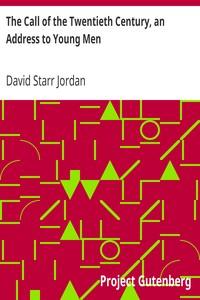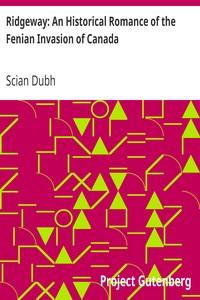Read this ebook for free! No credit card needed, absolutely nothing to pay.
Words: 16244 in 4 pages
This is an ebook sharing website. You can read the uploaded ebooks for free here. No credit cards needed, nothing to pay. If you want to own a digital copy of the ebook, or want to read offline with your favorite ebook-reader, then you can choose to buy and download the ebook.


: The Call of the Twentieth Century an Address to Young Men by Jordan David Starr - Conduct of life; Young men
THE CALL OF THE TWENTIETH CENTURY
An Address to Young Men
Chancellor of Leland Stanford Junior University
To Vernon Lyman Kellogg
The new century has come upon us with a rush of energy that no century has shown before. Let us stand aside for a moment that we may see what kind of a century it is to be, what is the work it has to do, and what manner of men it will demand to do it.
In most regards one century is like another. Just as men are men, so times are times. In the Twentieth Century there will be the same joys, the same sorrows, the same marrying and giving in marriage, the same round of work and play, of wisdom and duty, of folly and distress which other centuries have seen. Just as each individual man has the same organs, the same passions, the same functions as all others, so it is with all the centuries. But we know men not by their likenesses, which are many, but by differences in emphasis, by individual traits which are slight and subtle, but all-important in determining our likes and dislikes, our friendships, loves, and hates. So with the centuries; we remember those which are past not by the mass of common traits in history and development, but by the few events or thoughts unnoticed at the time, but which stand out like mountain peaks raised "above oblivion's sea," when the times are all gathered in and the century begins to blend with the "infinite azure of the past." Not wars and conquests mark a century. The hosts grow small in the vanishing perspective, "the captains and the kings depart," but the thoughts of men, their attitude toward their environment, their struggles toward duty,--these are the things which endure.
As the century is strenuous so will it be complex. The applications of science have made the great world small, while every part of it has grown insistent. As the earth has shrunk to come within our grasp, so has our own world expanded to receive it. "My mind to me a kingdom is," and to this kingdom all the other kingdoms of the earth now send their embassadors. The complexity of life is shown by the extension of the necessity of choice. Each of us has to render a decision, to say yes or no a hundred times when our grandfathers were called upon a single time. We must say yes or no to our neighbors' theories or plans or desires, and whoever has lived or lives or may yet live in any land or on any island of the sea has become our neighbor. Through modern civilization we are coming into our inheritance, and this heirloom includes the best that any man has done or thought since history and literature and art began. It includes, too, all the arts and inventions by which any men of any time have separated truth from error. Of one blood are all the people of the earth, and whatsoever is done to the least of these little ones in some degree comes to me. We suffer from the miasma of the Indian jungles; we starve with the savages of the harvestless islands; we grow weak with the abused peasants of the Russian steppes, who leave us the legacy of their grippe. The great volcano which buries far off cities at its foot casts its pitying dust over us. It is said that through the bonds of commerce, common trade, and common need, there is growing up the fund of a great "bank of human kindness," no genuine draft on which is ever left dishonored. Whoever is in need of help the world over, by that token has a claim on us.
In our material life we draw our resources from every land. Clothing, spices, fruits, toys, household furniture,--we lay contributions on the whole world for the most frugal meal, for the humblest dwelling. We need the best work of every nation and every nation asks our best of us. The day of home-brewed ale, of home-made bread, and home-spun clothing is already past with us. Better than we can do, our neighbors send us, and we must send our own best in return. With home-made garments also pass away inherited politics and hereditary religion, with all the support of caste and with all its barriers. We must work all this out for ourselves; we must make our own place in society; we must frame our own creeds; we must live our own religion; for no longer can one man's religion be taken unquestionably by any other. As the world has been unified, so is the individual unit exalted. With all this, the simplicity of life is passing away. Our front doors are wide open as the trains go by. The caravan traverses our front yard. We speak to millions, millions speak to us; and we must cultivate the social tact, the gentleness, the adroitness, the firmness necessary to carry out our own designs without thwarting those of others. Time no longer flows on evenly. We must count our moments, so much for ourselves, so much for the world we serve and which serves us in return. We must be swift and accurate in the part we play in a drama so mighty, so strenuous, and so complex.
More than any of the others, the Twentieth Century will be democratic. The greatest discovery of the Nineteenth Century was that of the reality of external things. That of the Twentieth Century will be this axiom in social geometry: "A straight line is the shortest distance between two points." If something needs doing, do it; the more plainly, directly, honestly, the better.
The earlier centuries cared little for the life of a man. Hence they failed to discriminate. In masses and mobs they needed kings and rulers but could not choose them. Hence the device of selecting as ruler the elder son of the last ruler, whatever his nature might be. A child, a lunatic, a monster, a sage,--it was all the same to these unheeding centuries. The people could not follow those they understood or who understood them. They must trust all to the blind chance of heredity. Tyrant or figurehead, the mob, which from its own indifference creates the pomp of royalty, threw up its caps for the king, and blindly died for him in his courage or in his folly with the same unquestioning loyalty. In like manner did the mob fashion lords and princes, each in its own image. Not the man who would do or think or help, but the eldest son of a former lord was chosen for its homage. The result of it all was that no use was made of the forces of nature, for those who might have learned to control them were hunted to their death. The men who could think and act for themselves were in no position to give their actions leverage.
When a people really means to do something, it must resort to democracy. It must value men as men, not as functions of a chain of conventionalities. "America," says Emerson, "means opportunity;" opportunity for work, opportunity for training, opportunity for influence. Democracy exalts the individual. It realizes that of all the treasures of the nation, the talent of its individual men is the most important. It realizes that its first duty is to waste none of this. It cannot afford to leave its Miltons mute and inglorious nor to let its village Hampdens waste their strength on petty obstacles while it has great tasks for them to accomplish. In a democracy, when work is to be done men rise to do it. No matter what the origin of our Washingtons and Lincolns, our Grants and our Shermans, our Clevelands or our Roosevelts, our Eliots, our Hadleys, or our Remsens, we know that they are being made ready for every crisis which may need their hand, for every work we would have them carry through. To give each man the training he deserves is to bring the right man face to face with his own opportunity. The straight line is the shortest distance between two points in life as in geometry. For the work of a nation we may not call on Lord This or Earl That, whose ancestors have lain on velvet for a thousand years; we want the man who can do the work, who can face the dragon, or carry the message to Garc?a. A man whose nerves are not relaxed by centuries of luxury will serve us best. Give him a fair chance to try; give us a fair chance to try him. This is the meaning of democracy; not fuss and feathers, pomp and gold lace, but accomplishment.
Democracy does not mean equality--just the reverse of this, it means individual responsibility, equality before the law, of course--equality of opportunity, but no other equality save that won by faithful service. That social system which bids men rise must also let them fall if they cannot maintain themselves. To choose the right man means the dismissal of the wrong. The weak, the incompetent, the untrained, the dissipated find no growing welcome in the century which is coming. It will have no place for unskilled laborers. A bucket of water and a basket of coal will do all that the unskilled laborer can do if we have skilled men to direct them. The unskilled laborer is no product of democracy. He exists in spite of democracy. The children of the republic are entitled to something better. A generous education, a well-directed education, should be the birthright of each one of them. Democracy may even intensify natural inequalities. The man who cannot say no to cheap and vulgar temptations falls all the lower in the degree to which he is a free agent. In competition with men alert, loyal, trained and creative, the dullard is condemned to a lifetime of hard labor, through no direct fault of his own. Keep the capable man down and you may level the incapable one up. But this the Twentieth Century will not do. This democracy will not do; this it is not now doing, and this it never will attempt. The social condition which would give all men equal reward, equal enjoyment, equal responsibility, may be a condition to dream of. It may be Utopia; it is not democracy. Sir Henry Maine describes the process of civilization as the "movement from status to contract." This is the movement from mass to man, from subservience to individualism, from tradition to democracy, from pomp and circumstance of non-essentials to the method of achievement.
Free books android app tbrJar TBR JAR Read Free books online gutenberg
More posts by @FreeBooks

: The Atlantic Monthly Volume 04 No. 26 December 1859 A Magazine of Literature Art and Politics by Various - American periodicals The Atlantic Monthly


: The Quest of Happy Hearts by Hay Kathleen - Christian life Juvenile fiction; Conduct of life Juvenile fiction; Siblings Juvenile fiction; Aunts Juvenile fiction





